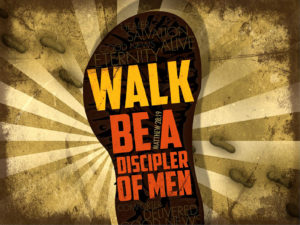Up To Jerusalem
 Jesus has been moving toward Jerusalem for His entire life. Of course we know that He has been to Jerusalem before. He went there with His family as a child, and there are several stories in the Bible about things He did there during His ministry. But when He told His disciples in Luke 18 that they were going “up to Jerusalem,” that phrase took on a different meaning. Everything in His life on Earth was leading to what was about to happen. Even as Jesus explained it to them again, they still did not know exactly what He meant. But He knew.
Jesus has been moving toward Jerusalem for His entire life. Of course we know that He has been to Jerusalem before. He went there with His family as a child, and there are several stories in the Bible about things He did there during His ministry. But when He told His disciples in Luke 18 that they were going “up to Jerusalem,” that phrase took on a different meaning. Everything in His life on Earth was leading to what was about to happen. Even as Jesus explained it to them again, they still did not know exactly what He meant. But He knew.Jesus knew all along what that journey toward Jerusalem would mean for Him. His disciples did not yet realize that it would also change their lives forever. Following Jesus had not always been easy, but it was about to get substantially more difficult. As a result, many of His followers would leave. However those who stayed would grow in faith and boldness and would continue to live out the teachings of Jesus while telling His story. The Southwest Church of Christ is here because they followed the command of Jesus to “Go and make disciples.” Those disciples made more disciples who in turn made more for generations until the disciples here at Southwest came along. Since we continue to fill that role here in Ada, we might ask ourselves the question, “What does a disciple look like?” If that’s who we are, it should be unmistakable to people around us.
In his book, D2: Becoming a Devoted Follower of Christ, Phil McKinney answers the question of what a disciple looks like with these characteristics:
- A disciple is committed. (2 Corinthians 5:15)
- A disciple is obedient. (1 John 5:1-5)
- A disciple is a lifelong learner. (Proverbs 9:9-10)
- A disciple is a fruit bearer. (Galatians 5:22-23)
- A disciple is devoted to prayer and practices. (Luke 11:1-4)
- A disciple is shaped by the Word. (Acts 17:11)
- A disciple is a servant. (Acts 6:1-4)
- A disciple is a witness. (Matthew 28:18-20)
- A disciple is a cheerful giver. (1 Corinthians 16:1-2)
- A disciple is faithful. (Hebrews 10:24-25)
As we strive to be better disciples and to fulfill the great commission to make more disciples, let’s consider what that looks like and how we can continue to grow in these areas.
– Brian
“How beautiful upon the mountains are the feet of him who brings good news, who publishes peace, who brings good news of happiness, who publishes salvation, who says to Zion, ‘Your God reigns.’” (Isaiah 52:7)
Underdogs

Bracket photo courtesy of ESPN
The underdog stories we find in scripture are so much greater than the best March Madness games. Jacob went from being the younger brother to being the father of the tribes of Israel. Joseph went from slave to second only to Pharaoh in Egypt. Moses went from spending years on the run to leading Israel to freedom. Gideon went from fearful separating wheat to become a victorious warrior. David went from being the overlooked son to defeating a giant to becoming king over Israel. Rahab went from prostitute to saving the spies to the genealogy of the Savior. Repeatedly in the Bible no one could imagine the way these lives would change and the things they would do. Well, there is One who could imagine it. God authors an amazing story that includes each of these stories. It also includes ours.
The God that did these things created us in His image to do things He has designed us to do. When we cheer the underdog story, God is well aware of what those people can accomplish as He works through them. When we lack confidence in our own abilities, God has full confidence in His. He will work out His plan with us as He has countless times before. When we look to the end of the story we know He will be victorious, and we know that He wants His people to be there with Him.
Brian
“What then shall we say to these things? If God is for us, who can be against us?” – Romans 8:31
Sanctified
 Sanctified is one of those Bible words that gets thrown around quite a bit but is used in many ways beyond the scriptural idea. At the beginning of 1 Corinthians, Paul writes to the church at Corinth referring to them as “those sanctified in Christ Jesus.” To be sanctified basically means to be set apart for a purpose.
Sanctified is one of those Bible words that gets thrown around quite a bit but is used in many ways beyond the scriptural idea. At the beginning of 1 Corinthians, Paul writes to the church at Corinth referring to them as “those sanctified in Christ Jesus.” To be sanctified basically means to be set apart for a purpose.In his book, Possessed By God: A New Testament Theology of Sanctification and Holiness, David Peterson asserts that sanctification is not a one time event but is something that is ongoing. He writes that, “Sanctification is a state in which believers find themselves because of the work of Christ and the operation of His Spirit in their lives. They are called to remain in that state by living in correspondence to their given holiness.” For the Christian, Peterson lists four characteristics of a sanctified life.
- “Our essential identity as Christians is formed by Christ and the gospel, not by our own personalities, backgrounds or achievements.” Our identity is first and foremost Christian. All other identifiers are lesser priorities.
- “Although God calls upon us to express the fact that we have been sanctified by the way we live, our standing with Him does not depend on the degree to which we live up to His expectations.” We cannot do enough to earn His love. His love is freely given. Obviously His desire for us is sin-free lives, but He stands ready to forgive when we repent for falling short of that goal.
- “We must continue to see ourselves as God sees us in Christ.” That great command to love our neighbors as ourselves demands that we love ourselves to begin with. God sees us as His children created in His image. We need to see the same.
- “What will it meant to view one another as those already sanctified in Christ? When we overwhelm people with conditions they must fulfill to prove that they are making progress as Christians, we distort the gospel.” It is easy for us to decide the way others should live and where they are falling short. Jesus reminds us to check our own eyes before focusing on theirs. God works in each of our lives in different ways and in different timing.
Continue to live a life that is sanctified in Christ and to let the light of that sanctified life shine brightly. People will be drawn to Him.
Brian
The Unfaithful Faithful
 In his book entitled Grow Your Church From the Outside In, George Barna, who is an expert in church related statistical studies and analysis, spends a lot of time comparing churched and unchurched people. I was struck by the way he introduced a chapter about the faith of the unchurched.
In his book entitled Grow Your Church From the Outside In, George Barna, who is an expert in church related statistical studies and analysis, spends a lot of time comparing churched and unchurched people. I was struck by the way he introduced a chapter about the faith of the unchurched.“Every time they step on the brakes of their cars, they exhibit tremendous faith in gadgets that most of them know nothing about. Each time they go out in public, they demonstrate faith in the behavior and morals of humankind, believing they will not be shot or mugged. When they take a bite of food that has been prepared in a restaurant by a chef they never see or do not know, they show the faith that they possess, believing that it was properly cooked and not poisoned. Each time they make a bank deposit, they engage in an act of faith, believing that their money will be returned to them, perhaps with interest. The issue is not whether they have faith; rather, it is where they place their faith.”
We may not think of people who are not part of the church as people who have faith. Barna illustrates that they are actually quite faithful, just not to the God we know. Unfortunately, that can be true of many of us too. We place our greatest faith in the wrong things. We can be blind to what we really need. The title of this article could really apply to either group who put their faith in the wrong place.
In Acts 3, we find the story of a beggar who was unable to walk and thought money was his greatest need. Peter and John did not have money to give, but they had something much greater to offer: healing. Instead of just getting a little more money to get by, his life was changed that day. His reaction in verse 8 is wonderful. “He jumped to his feet and began to walk. Then he went with them into the temple courts, walking and jumping, and praising God.” While the man focused on one need, Peter fulfilled a need that seemed unfixable. Are we placing our faith in the things of this world, or do we instead jump to our feet and praise the God who loves us and knows what we need?
– Brian
Created to Do Good
 Many people go through life in search of direction or meaning. They wonder what town they should live in, what school they should attend, what career path they should take, who they should spend their lives with and what all of that means in the big picture. Many reach a point where they think they have all of it figured out only to have life hit them with something that brings all the questions back. Why are we here? What were we created to do? God offers us an answer through the writings of Paul.
Many people go through life in search of direction or meaning. They wonder what town they should live in, what school they should attend, what career path they should take, who they should spend their lives with and what all of that means in the big picture. Many reach a point where they think they have all of it figured out only to have life hit them with something that brings all the questions back. Why are we here? What were we created to do? God offers us an answer through the writings of Paul.In Ephesians 2 we read, “For we are God’s handiwork, created in Christ Jesus to do good works, which God prepared in advance for us to do.” We can learn a lot from those 22 words.
First, God views us as his handiwork. For any of us who have made anything, we understand that is a big deal. On my desk is a wood bowl handcrafted by a woodworker from the church in Eugene and a clay pot handcrafted in elementary school by one of my boys. Both took talent and creativity to make, and both of their craftsmen were proud of the finished results. Second, we see that God designed us to do good works. That’s the reason we feel great when we help others. It’s the reason that we feel a sense of fulfillment in a job well done.
Third, we see that He also prepared works for us. As we seek out those good works, let’s be confident that God has something in mind for each of us to do and that He loves to see us find and do good works. It’s what He made us to do. This is another of those times that our lessons from Sunday morning and Sunday evening converge. In Luke 9 we find Jesus giving the apostles a task as He continues to teach them, then a larger group of disciples is sent out in Luke 10 to spread the good news. On Sunday evening last week and again this week, we are talking about the will of God. As we see in Ephesians 2, part of His will is for each of us to do good works. Let’s always seek out the good works He has prepared for us.
– Brian
Do not be conformed to this world, but be transformed by the renewal of your mind, that by testing you may discern what is the will of God, what is good and acceptable and perfect. – Romans 12:2
Reading and Meditating
 In his Wednesday night class last week, David emphasized the importance of reading God’s word. Although his point is true, I often wonder what those who do not enjoy reading might think. Jacob Hawk, who spoke for our summer series last year and will be teaching a class at Affirming the Faith in Oklahoma City next weekend, wrestled with that idea in his post that I would like to share with you this week. – Brian
In his Wednesday night class last week, David emphasized the importance of reading God’s word. Although his point is true, I often wonder what those who do not enjoy reading might think. Jacob Hawk, who spoke for our summer series last year and will be teaching a class at Affirming the Faith in Oklahoma City next weekend, wrestled with that idea in his post that I would like to share with you this week. – BrianRecollection and understanding of Scripture is key to spiritual health and development. It’s also imperative for faith to begin, as Paul reminds the church at Rome in Romans 10:17, “Faith comes by hearing, and hearing by the word of God.”
But what if we don’t enjoy reading? What if we aren’t a “book worm”? What if we have a hard time concentrating and focusing, and then forget what we just read? Many struggle with this and, consequently, stop reading Scripture seriously. King David said the “blessed” man is the one who “meditates” on the Law day and night (Psalm 1:1-2). Does this mean our lives can’t be blessed if we aren’t good “readers”? Do we have to be a good English student to be a good Bible student? (Click here to continue reading.)
Love Is In the Air
 Like a lot of us, I found myself in the seasonal department at Walmart recently. I was there on February 13, which sadly is a little ahead of the game for me. I was amazed to find how much better the selection is the day before the big day. People were there looking at cards, candy, flowers and all kinds of red items with hearts. CNN.com reported on Valentine’s Day spending. Americans buy lots of gifts to show their love this month. Here is the breakdown by the numbers:
Like a lot of us, I found myself in the seasonal department at Walmart recently. I was there on February 13, which sadly is a little ahead of the game for me. I was amazed to find how much better the selection is the day before the big day. People were there looking at cards, candy, flowers and all kinds of red items with hearts. CNN.com reported on Valentine’s Day spending. Americans buy lots of gifts to show their love this month. Here is the breakdown by the numbers:
$130.97 — The per person average estimated amount that people will spend on Valentine’s Day
224 million — The estimated number of roses grown for Valentine’s Day
51% — The percentage of people who buy red roses for this holiday
64% — The percentage of men who buy flowers for Valentine’s Day
36% — The percentage of women who buy flowers for Valentine’s Day
$18.6 billion — The total spending that will be reached by Valentine’s Day
$1.6 billion — The amount people will spend on candy
$1.9 billion — The amount people will spend on flowers
$4.4 billion — The amount people will spend on diamonds, gold and silver
And this is one of the best statistics: there are 1400 varieties of Valentine’s cards available at Hallmark. 1400 ways to express love. As eloquent as Hallmark may be, the best description of love is found in 1 Corinthians 13 and it has little to do with romance. There Paul writes, “Love is patient, love is kind. It does not envy, it does not boast, it is not proud. It does not dishonor others, it is not self-seeking, it is not easily angered, it keeps no record of wrongs. Love does not delight in evil but rejoices with the truth. It always protects, always trusts, always hopes, always perseveres. Love never fails.” Obviously the love Paul wrote about might not be exactly what greeting card makers have in mind, but that kind of love will make all of our relationships better. When we love people the way we read about in 1 Corinthians 13, our world will know more about Jesus. When we love our spouses that way, it will show our love far better than any gift or card. Let’s all work to be known by our love on one day in February and on the other 364 days of the year.
– Brian
“A new commandment I give to you, that you love one another: just as I have loved you, you also are to love one another. By this all people will know that you are my disciples, if you have love for one another.” – John 13:3-35
Little, But Powerful
 Gary Hampton was my preacher in high school, and later he was the preacher in Valdosta, Georgia where I was a youth ministry intern for a summer in college. He shared an article this week that I think is worth sharing with you. Our words have great power to harm or encourage. Let’s all be careful how we use them – Brian
Gary Hampton was my preacher in high school, and later he was the preacher in Valdosta, Georgia where I was a youth ministry intern for a summer in college. He shared an article this week that I think is worth sharing with you. Our words have great power to harm or encourage. Let’s all be careful how we use them – BrianThe news seems to be filled with people whose tongues are out of control. Bad language and hurtful words are the rule of the day. God’s people must refrain from joining in, because he tells us about the power of that little member of the body.
A rider is able to control a horse by using a bridle in its mouth. Huge ships are turned with a small rudder. A little match can set a massive forest on fire. The tongue is small like a bridle, rudder or match, but it is able to do great things, good or bad. We need to keep control of our mouths lest they damage others or commit us to sinful ways (James 3:3-5; Psalm 39:1).
An uncontrolled tongue is totally wicked and devastating (Proverbs 16:27; 26:18-28). It stains the whole life in its sinfulness. It can set the stage for what emotions lead us to do. Hitler’s tongue led the whole world to war. The tongue’s fire is so destructive it can only be set on fire by hell, the place God prepared for the devil and his angels (James 3:6; Matthew 25:41).
Men use the tongue to praise God (Ephesians 5:19; Hebrews 13:15; Romans 10:9-10). Yet, the same tongue is used to pronounce curses on men, effectively praying to God to cause evil to fall down on them. The one who loves God must show it through his display of love for his fellow man, who is made in the image of God (James 3:9; 1 John 4:20-21; Matthew 25:31-46; Genesis 1:26).
Praising God and cursing man with the same tongue is as contradictory as a fountain giving sweet and bitter water at the same time. It is as absurd as a fig tree bearing olives, a vine producing figs or a fountain producing fresh and salt water (James 3:10-12).
Our mouths tell others what is in our hearts (Proverbs 4:23; Matthew 15:18). Getting our hearts right with God will result in good words coming from our lips to or about our fellow man.
Gary C. Hampton
Groundhog Day
 We have holidays in America to recognize or remember presidents, historical figures and significant events among other things. One of the most unique and odd holidays occurs this weekend: Groundhog Day. Dating back to the late 1800’s, the most famous resident of a small town in Philadelphia lives in a hole in the ground. On February 2, everyone waits to see if Phil, the groundhog, will see its shadow when it comes out and whether it will then retreat back inside. For some reason it has been decided the groundhog’s reaction is an indicator of how much longer winter will last. Future anthropologists will see that the same nation that waits for this each year also landed a man on the moon, and they will be baffled.
We have holidays in America to recognize or remember presidents, historical figures and significant events among other things. One of the most unique and odd holidays occurs this weekend: Groundhog Day. Dating back to the late 1800’s, the most famous resident of a small town in Philadelphia lives in a hole in the ground. On February 2, everyone waits to see if Phil, the groundhog, will see its shadow when it comes out and whether it will then retreat back inside. For some reason it has been decided the groundhog’s reaction is an indicator of how much longer winter will last. Future anthropologists will see that the same nation that waits for this each year also landed a man on the moon, and they will be baffled.In the 90’s, there was a movie set in this Pennsylvania town called Groundhog Day. In the movie, there is another character named Phil (not the groundhog), who is a TV reporter sent from the big city to cover the groundhog story. Phil is a cynical guy, who thinks this small town and their big event is just a big waste of time. While in town, he falls for a local woman, Rita. He does not make a good first impression. Things take a strange turn when Phil wakes up the next morning to find that it is Groundhog Day again. The day keeps repeating over and over. Phil uses this repeating day to learn everything he can about Rita: her favorite foods, poets and interests. Then he becomes an expert in all of them to attempt to win her over. Don’t take this as a movie recommendation, but it does raise an interesting thought.
I’ve often wondered when considering that movie how many people long for that possibility to relive a moment or a day. Do you have a moment that you wish you could go back and change? It is so easy for us to live with that regret, and it can keep us from moving forward. God does not give us that day to do over again, but He does give us freedom from that regret. When Paul wrote to the Corinthian church, he knew that some of his writings might cause them to regret their actions, but his goal was not to have them continue in that regret. It was to motivate them to learn from it and be better. In 1 Corinthians 7:9-10 he wrote, “As it is, I rejoice, not because you were grieved, but because you were grieved into repenting. For you felt a godly grief, so that you suffered no loss through us. For godly grief produces a repentance that leads to salvation without regret, whereas worldly grief produces death.”
Salvation without regret. What Paul wanted for the Corinthians is the same thing God wants for us. Embrace the salvation He gives and move on to a new day.
– Brian
Being Disciples and Making Disciples
 As I have mentioned a few times, I enjoy golf. It is fun to get out on the golf course, to visit with friends as we walk or ride along and to try to get the ball from the tee to the hole. I emphasize the word try because I am not very good at golf. I enjoy it as much as a bad golfer can, but I never seem to improve. With most sports I enjoy, I have tried to share that enjoyment with my kids. We have shot baskets together or thrown a ball around. We have ridden our bicycles and lifted weights. But when it comes to golf, I have always been hesitant. Why? Because however you may have imagined my description of being bad at golf, the reality is likely quite a bit worse. I would love for them to enjoy the game and even play with me, but I don’t like the thought of them learning it from me. I want to them to learn well. I want them to be better. Fortunately I have not been called to make golfers.
As I have mentioned a few times, I enjoy golf. It is fun to get out on the golf course, to visit with friends as we walk or ride along and to try to get the ball from the tee to the hole. I emphasize the word try because I am not very good at golf. I enjoy it as much as a bad golfer can, but I never seem to improve. With most sports I enjoy, I have tried to share that enjoyment with my kids. We have shot baskets together or thrown a ball around. We have ridden our bicycles and lifted weights. But when it comes to golf, I have always been hesitant. Why? Because however you may have imagined my description of being bad at golf, the reality is likely quite a bit worse. I would love for them to enjoy the game and even play with me, but I don’t like the thought of them learning it from me. I want to them to learn well. I want them to be better. Fortunately I have not been called to make golfers.You and I have been called to make disciples. That command given by Jesus at the end of Matthew 28 is not optional. If we view our skills in that area in the same way that I view my golf skills, then there is only one solution: work to improve. Become the disciples we want others to be. Kenneth Boa explains how this works in his book, Conformed to His Image.
“We teach what we believe, but we reproduce what we are. Although God in His grace may often use us in spite of ourselves, we normally cannot impart what we do not possess. Discipleship does not happen by accident; it is a process that is animated by an ongoing intention of the heart. No one suddenly stumbles into spirituality, and if we do not decide to apprentice ourselves to Jesus’ authority, we will not become His disciples. Similarly, if we do not consciously intend to reproduce the life of Christ in others, we will miss our calling to make disciples. The more we know Christ, the better we can make Him known.”
That last sentence is the key. To make disciples, we must know Christ well. To teach others to live like Him, we have to be the example of living like Him. It was His design with His first apostles, and it is His design with us today. Don’t hesitate. Be like Him.
– Brian
And I, when I came to you, brothers, did not come proclaiming to you the testimony of God with lofty speech or wisdom. For I decided to know nothing among you except Jesus Christ and him crucified. (1 Corinthians 2:2)

